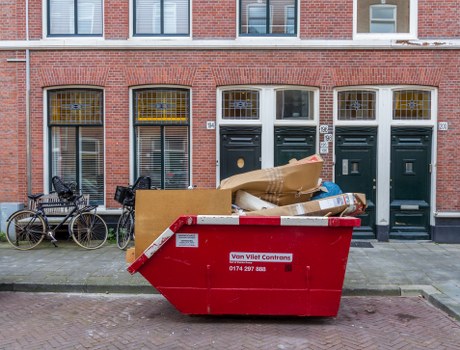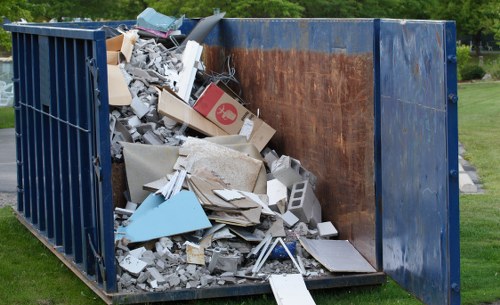Council Rubbish Collection in London: A Comprehensive Guide

Understanding Council Rubbish Collection
Living in London means adhering to various local services, and one of the most essential is council rubbish collection. This service ensures that waste is managed efficiently, keeping neighborhoods clean and healthy.
Each London borough has its own schedule and regulations for rubbish collection. It's crucial to be aware of these to avoid fines and contribute to a cleaner environment.
Proper rubbish collection not only removes waste but also supports recycling efforts, reducing the amount of waste that ends up in landfills.

Scheduling and Collection Days
Rubbish collection days vary across different boroughs. Typically, residents receive a calendar indicating their specific collection schedule.
It's important to place bins at the curb on the designated days to ensure timely collection. Missing a collection day can lead to overflows and fines.
Some areas offer flexible collection schedules for bulky items, providing residents with convenience when disposing of large waste items.

What Can and Cannot Be Collected
Different types of waste have specific guidelines. General household waste, recyclables, and organic waste are commonly collected by councils.
However, hazardous materials like batteries, chemicals, and electronic waste require special disposal methods and should not be placed in regular bins.
Understanding these guidelines helps in effective waste segregation, promoting recycling and reducing environmental impact.

Recycling Services
Recycling is a significant part of council rubbish collection. Residents are encouraged to separate recyclables such as paper, plastics, and metals from general waste.
Many councils provide separate bins for recyclables, making it easier for residents to participate in recycling programs.
Proper recycling not only conserves resources but also minimizes the carbon footprint associated with waste disposal.

Special Collection Services
Special items like electronics, furniture, and garden waste often require separate collection services. Councils usually offer scheduled pickups for these items.
Residents can book special collection services online or via phone, ensuring that bulky or hazardous items are disposed of safely.
These services help maintain community cleanliness and prevent improper disposal of large or dangerous waste.
Fees and Fines
While general rubbish collection is usually free for residents, there may be fees for additional services like extra bin collections or special pickups.
Failure to comply with rubbish collection rules can result in fines. Common violations include missing collection days or improper waste disposal.
Understanding the fee structure and adhering to guidelines can help avoid unnecessary penalties.
How to Report Issues
If you encounter issues with rubbish collection, such as missed collections or overflowing bins, councils typically provide multiple reporting channels.
Residents can report problems online, via phone, or through dedicated mobile apps, ensuring timely resolution of waste management issues.
Effective reporting helps councils improve their services and maintain community standards.
Benefits of Proper Waste Management
Effective rubbish collection contributes to public health by reducing the risk of diseases associated with waste accumulation.
It also enhances the aesthetic appeal of neighborhoods, making them more pleasant places to live.
Moreover, proper waste management supports environmental sustainability by promoting recycling and reducing landfill use.
Technology in Rubbish Collection
Modern technologies are transforming rubbish collection services. Smart bins equipped with sensors can monitor waste levels, optimizing collection schedules.
Data analytics help councils predict waste generation patterns, enhancing the efficiency of collection routes.
Adopting such technologies leads to cost savings and a more sustainable waste management system.
Environmental Impact
Proper rubbish collection plays a crucial role in minimizing environmental pollution. By ensuring waste is collected and processed correctly, councils help protect natural resources.
Recycling initiatives reduce the need for raw materials, conserving energy and reducing greenhouse gas emissions.
Effective waste management also mitigates the impact on wildlife, preventing harmful materials from entering ecosystems.
Closest Areas to London for Council Rubbish Collection
Understanding how rubbish collection operates in areas surrounding London can be beneficial for residents and visitors. Here are some of the closest areas:
- Barnet: Located just north of London, Barnet offers efficient waste collection services with an emphasis on recycling.
- Bexley: Southeast of London, Bexley provides regular rubbish pickups and special collection for bulky items.
- Brent: Situated northwest, Brent focuses on sustainable waste management practices.
- Bromley: South-east of London, Bromley has extensive recycling programs and timely collections.
- Camden: Central London area with stringent waste disposal regulations and effective collection systems.
- Enfield: North of London, Enfield offers comprehensive rubbish collection and recycling services.
- Greenwich: Southeast of central London, Greenwich emphasizes environmental-friendly waste management.
- Hackney: East London borough known for its innovative waste collection and recycling initiatives.
- Hammersmith and Fulham: West London area with robust rubbish collection schedules and recycling efforts.
- Haringey: North London borough providing reliable rubbish and recycling collection services.
- Kingston upon Thames: Southwest of London, Kingston focuses on efficient waste management and community recycling programs.
- Lambeth: Central London borough with active rubbish collection and environmental sustainability programs.
Tips for Efficient Rubbish Collection
To make the most of your council rubbish collection service, consider the following tips:
- Sort your waste: Separating recyclables from general waste simplifies the collection process and supports recycling efforts.
- Follow the schedule: Adhere to your borough's collection calendar to avoid missed pickups.
- Reduce waste: Minimizing the amount of rubbish you produce helps lessen the burden on waste management systems.
- Use appropriate bins: Ensure you have the right bins for different types of waste as per council guidelines.
- Participate in recycling programs: Engage with local recycling initiatives to contribute to environmental sustainability.
Implementing these practices not only helps you stay compliant but also contributes to a cleaner and healthier community.
Future of Rubbish Collection in London
The future of council rubbish collection in London is poised to become even more sustainable and efficient. Innovations in waste management technology and increased recycling efforts are on the horizon.
Plans include expanding smart waste collection systems, enhancing recycling facilities, and promoting community engagement in waste reduction programs.
As London continues to grow, adapting rubbish collection services to meet the demands of a larger population will be crucial for maintaining city cleanliness and environmental health.
Conclusion
Council rubbish collection is a vital service that ensures the cleanliness and sustainability of London. By understanding the schedules, guidelines, and available services, residents can effectively manage their waste and contribute to a healthier environment.
Engaging with local waste management programs and staying informed about council policies helps maintain the balance between urban living and environmental responsibility.
As technology advances and sustainability becomes increasingly important, council rubbish collection services will continue to evolve, fostering a cleaner and greener London for all.
Frequently Asked Questions
1. How do I find out my rubbish collection day in London?
You can find your rubbish collection day by visiting your local council's website and entering your postcode. Most councils provide a detailed collection calendar for residents.
2. What items are not accepted in regular rubbish collection?
Hazardous materials, electronic waste, batteries, and large bulky items are typically not accepted in regular rubbish collection. These items require special disposal methods.
3. Is there a fee for recycling services?
Generally, recycling services are provided for free by the council. However, fees may apply for additional services like extra bin collections or special pickups.
4. How can I report a missed rubbish collection?
You can report a missed rubbish collection through your local council's online portal, by phone, or via their mobile app, ensuring the issue is addressed promptly.
5. What are the benefits of participating in recycling programs?
Participating in recycling programs helps conserve natural resources, reduces landfill waste, lowers greenhouse gas emissions, and promotes environmental sustainability.